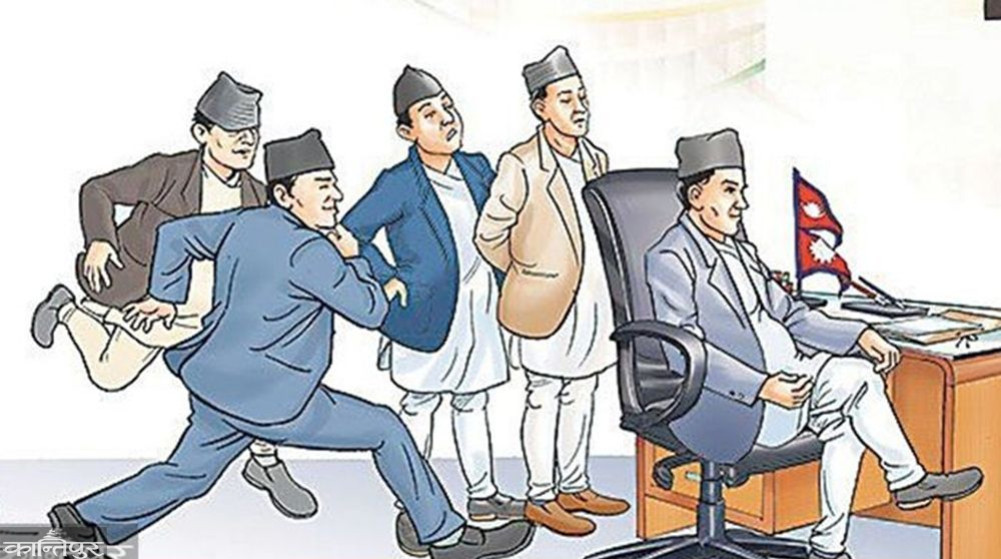The politics of disruption
We use Google Cloud Translation Services. Google requires we provide the following disclaimer relating to use of this service:
This service may contain translations powered by Google. Google disclaims all warranties related to the translations, expressed or implied, including any warranties of accuracy, reliability, and any implied warranties of merchantability, fitness for a particular purpose, and noninfringement.


Prime Minister Pushpa Kamal Dahal, who is also the chairman of the Maoist party, is determined to continue disrupting order. As he extends his leadership tenure by shuffling power partners, he has described it as a new disorganization. That's what he says many times, 'we are not allowed to fail, the hunger for change is not quenched.'



But Dahal, who likes Helin in the behind-the-scenes game, has termed his changed interest in political jargon as 'Krambhang'. It has become a practice of conniving politics to create a narrative that fake currency is genuine. As he claimed, did the politics of disruption give new enthusiasm to the grassroots?
The fear of uncertainty has not disappeared even though the Prime Minister has tried to bring new partner parties with him to change the situation of his uncontrolled government. The regular contingency of 'love' and 'breakup' with a partner has become his modus operandi. The comment that 'partners have changed but the government character has not changed' has strongly ruled the ground level. How long the new partner lasts or stays together is not important. Common people are curious as to what basis or reason a new alliance was suddenly formed and what will be the background of this alliance collapsing tomorrow. It is unclear what kind of chess game Dahal, a combination of rigidity and flexibility, will play to maintain his relevance in power politics. It can be said that he does not prefer to walk in a straight line, he must be disrupted.
What the government is unable to reveal is that not all those expressing frustration and dissatisfaction are anti-establishment. Seeking, discussing and talking about a just society is not regressive. Rather than whether Ram Lal or Shyamlal joined the government, the real challenge of a republican government is to find new heights to address the collective discontent of those who feel deprived, oppressed or unequal. Changing partners does not mean feeding the new middle class, giving Sapnath the concession of exploitation in the place of Nagnath, or giving the country to one another, but giving a just solution to the discontent that is pouring out on the streets. How many of those who can challenge their partners who claim to be communists from the right-wing infatuation to take a leap of disorder in the politics dominated by self-interest and power?
While the scenario of changing partners is being drawn up, those who are victims of meter-banking or landless have come to the federal capital Kathmandu to express their concerns. Even now, who is getting land in the name of landless? Why is the state still dead in Musahar Basti? Why do these words of Arun Sadaka, a rights activist from Siraha, not shake anyone from the inside - 'The landless have no status in the society, their speech does not sell, when they stand up and speak, the wind blows them away, when they sit and speak, no one listens, because of this pain I am in the movement.'
fact and factor
In the provinces, the 'Khadau Sarkar' will again be run by the Centre. It was no longer a matter of ridicule or wonder. Power is a 'fact' for parties and a 'factor' of politics for identitarians. The political experiment of chaos is a mixture of wonderful visuals, joy, fascination and terror. The opposition is confident that Dahal's jet-setting government with new partners is unlikely to experience any mechanical problems. They are waiting to fall with the clouds at some unknown political height in the sky. Congress president Sher Bahadur Deuba has unwavering faith in his destiny, where the change of partnership in the government is such a spectacle, which is fickle.
is also a fact in the light of which some dimensions of the secret of Dahal's success can be understood. By becoming Prime Minister, Dahal shattered the traditional formulas of the parliamentary structure, which was considered the main basis for capturing and maintaining power in politics. He changed some formulas and tried to compose some new formulas. Being in power and being able to instill the psychological feeling of controlling power in its target group is an important part of Dahal's politics. In the midst of all the efforts to uproot him, those parties have taken turns to become refugees and the constant aggressive fascination towards him is proof of this. Apart from himself, players other than himself are also aware that this Moh Dahal is a security shield for power in this parliamentary term. Critics say, one day this fascination will break, and it has. But for now, this fascination remains.
Gobarko Halua!
There was no government to listen, grasp and realize the economic-social relations of the rural society, the life struggle of the poor-deprived community, the aspiration to live a life free from bondage, the restlessness that is rising in their minds, the urgency of change. In a democracy, the government needs to be comforting. Dahal has been failing in that matter. Who did the leadership choose as a partner in the journey? Who shouldered in the evening? Who played the flute in the morning? It is not accounted for. The fundamental aspect is whether the government is responsible or not? It is more of a grassroots anger than an investigation - 'You can't give the name of a carrot after distributing dung pudding.' Public service delivery is disgusting. The Dahal government is not working to alleviate the frustration and pain of the people in a way that can be seen and felt. The reality of the
is that the role of the leader of the parliament is not being effective. Apart from the practice of changing partners in the government, there is no impression that he has taken the fundamental issues of the nation seriously. The question of the effectiveness of the government is intertwined with the competence of the leader. The desire to influence a crowd of blind devotees and the ability to build by the cultivation of rumors of a selfish group does not increase the ability of the chief minister but rather neutralizes it. Increasing the effectiveness of the Prime Minister is the institutionalization of a democratic republic, so it should start with the continuous search for ways to increase the efficiency of their working style, functionality and work culture, and the maturity and courage to disrupt the order. The prodigy who hides his ineffectiveness by showing the head of a particular minister must be dismantled now. Due to the politics of disorganization envisioned by Dahal, the respect of the Parliament has decreased somewhat. What was the electoral coalition's mandate, which naturally eroded its effectiveness as well.
It is said in political science, political parties give more importance to principles and ideology at the beginning of establishment and over time, the main objective of the party is focused on gaining power and power. This statement is reflected in the role of new and old parties in Nepal. What these parties are forgetting is that the continuation of the status quo within the parties, as in the national life, cannot continue for many days.
Sher Bahadur Deuba, the progenitor of the coalition political culture in Nepal, should reform himself according to the demands of the times rather than blaming others. The infighting with Fagunhat Bayar points to a possible conflict within the Nepali Congress. The rivalry in the Congress ranks is gradually turning towards a suicidal direction that looks 'more chaotic than anyone else'. The main challenge of the Congress is none other than the cataract spread among its own workers, in which they are not able to find their own background, justification, utility and potential. There was suspicion on the ground that he had vision. Any party should remember that without clear ideology, dedicated workers, conscientious supporters and hard-working campaigners, no one's Mission-84 will be easy.
Jogira Sara...ra-ra
Dahal currently has a 'body government' while Oliji (Khadgprasad) has become a 'shadow government'. What has happened so far in Dahal Raj is a story, what is happening is a story and what is going to happen is becoming a story. In Madhesh, the tradition of singing Fagu song starts from Sri Panchami. Oliji played such a joke that brother Upendra Yadav started smiling as a witness. Dahal began to feel the real chaos, while Ravi Lamichhane began to stroke his beard. The Holi song started reverberating with the drum-majeera - 'Kekra Nadia mein dahiya jamawal/ Kekara le Mangala Joranwa, Gajab many dahal ai Oliji/ Maoisti Ke Nadia mein dahia jamawal Congress se lihal Joranwa, Gajab many dahal ai Oliji.'
Rural Congress devotees stuck in the party quagmire sang the Holi song in their own kitta – 'Nakbesar kaga le bhaga sainya abhaga na jaga.' ;
 प्रकाशित : फाल्गुन २४, २०८० ०८:२९
प्रकाशित : फाल्गुन २४, २०८० ०८:२९

 २१.१२°C काठमाडौं
२१.१२°C काठमाडौं
















